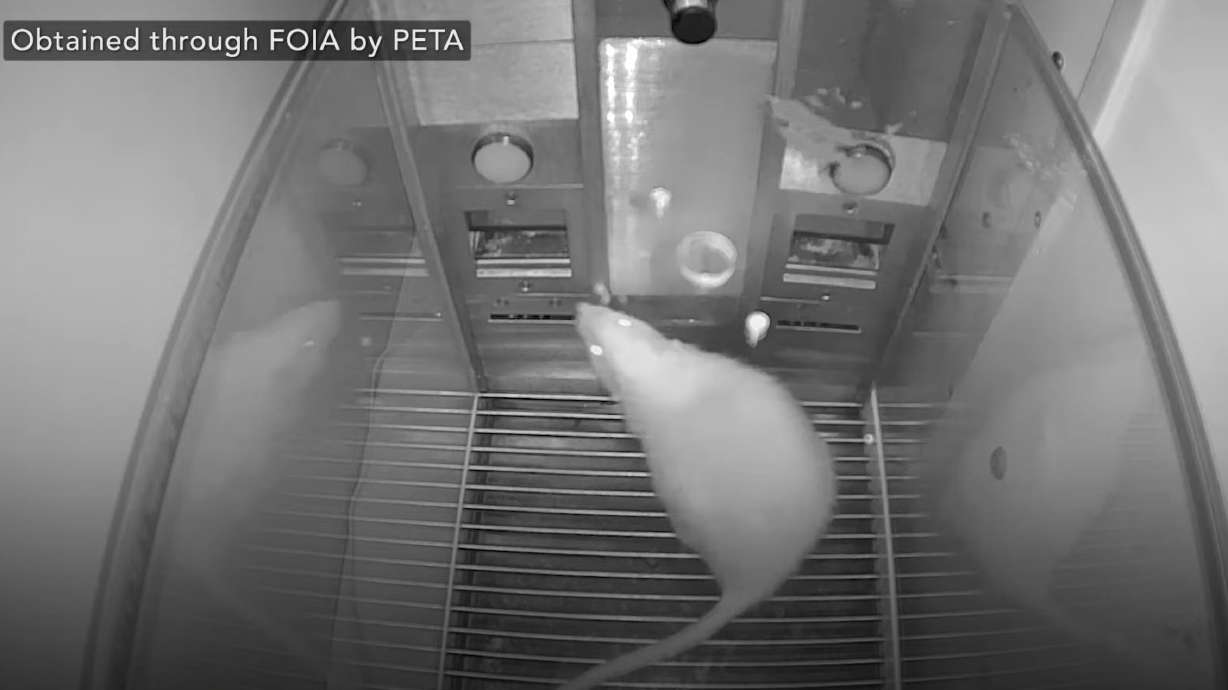Estimated read time: 3-4 minutes
This archived news story is available only for your personal, non-commercial use. Information in the story may be outdated or superseded by additional information. Reading or replaying the story in its archived form does not constitute a republication of the story.
LOGAN — People for the Ethical Treatment of Animals sent Utah State University's new president a letter Monday accusing the school of mistreatment of rats during a psychology course.
The animal rights organization claims that the Utah State course — PSY 3400: Advanced Analysis of Behavior — locks up rats in noisy metal boxes, shows them "disorienting lights" and allegedly deprives them of food, water and social interaction.
"The purported purpose is to train the animals to push a lever to receive food pellets. We're urging the school to switch to superior non-animal teaching methods," said Shalin Gala, vice president of PETA's international laboratory methods. "The point that I really want to emphasize is that the school itself previously was using an online rat simulator, so it's really nonsensical why they're now reverting back to using live rats to study human psychology."
Monday, PETA received 2022 video footage of both rats and pigeons in what it termed "barren" metal boxes. The footage was given in accordance with the Freedom of Information Act after PETA filed a public records request to the university.
Gala said the flashes of bright lights and confinement would be a source of intense stimuli for the rats, creating what he termed "negative stressors."
Amanda DeRito, the university's associate vice president for strategic communications, said that PETA's allegations are "a gross misrepresentation" of what the university was actually doing.
"Our practices are audited, meet all internal and external standards and are re-evaluated on a regular basis," DeRito said in an email to KSL.com.
In an earlier email that PETA said it received from DeRito, she added that the previous simulation methods the animal rights group cited were "ineffective" and did not assist students in learning about human psychology in the same way that using the live rats did.
This isn't the first time the animal rights group sent a letter to the university. In September, the organization sent then-USU president Noelle Cockett a letter urging her to replace the usage of rats with non-animal experiments.
PETA said it received an email response in October from DeRito, which said, "At the discretion of the instructor, the Advanced Analysis of Behavior undergraduate course (PSY 3400) is no longer using pigeons as of May 2022. At the conclusion of the program, most of the pigeons were adopted out as pets."
PETA then sent DeRito a follow-up response in November, asking whether the university was still using rats in different experiments. She noted then that "USU's review of currently available non-animal behavior models failed to identify any viable alternatives," according to PETA.
DeRito's email response, according to PETA, also called the computer simulation methods the organization cited in its letter "inadequate as they are woefully out of date and do not accurately model the response of rats to various experimental stimuli."
"The use of the computer simulations would thus lead to incorrect understanding and learning on the part of students. Humane use and care of the animals is a critical component of this course, and all individuals involved strive for the highest quality care of the animals," DeRito continued.
Gala disagreed.
"It's perplexing why the university is now reversing course and dismissing all existing computer simulation models, including the one that it previously used, and it's choosing now to instead use live rats who are very psychologically different, and physiologically different from humans," Gala said. "There's really no need to harm animals in this way in order to prepare students for a career in brain science."
In July, PETA sent another letter to the university citing various animal-free simulation models such as the Shaping Game, PsychMate, and open access data analysis.
Then, on Monday, the organization sent another one to Elizabeth Cantwell in hopes that the new Utah State president will take action on the issue.
"It's unclear at the moment how she'll respond," Gala said.








